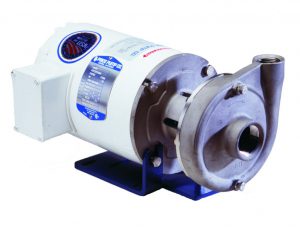Centrifugal Pumps
How to Maintain Your Centrifugal Pumps
If you work in any of the following industries, you need a centrifugal pump to complete your tasks properly:
- Acid transfer
- Food and beverage production
- Industrial water supply and drainage
- Irrigation
- Municipal water supply and drainage
- Oil refining
- Pharmaceuticals
- Power plants
- Sugar refining
- Wastewater management
- Water purification
As the head of an industrial or commercial company that uses centrifugal pumps, you know that these sturdy devices won’t often break down or stop working. However, to keep your pumps in good repair, safeguard yourself and your employees, and prevent lost work time and revenue, you need to take extra measures to ensure your centrifugal pumps always work properly.
Below, we’ve listed several maintenance tips you can employ on a daily or weekly basis to keep your centrifugal pumps in top condition. We’ll also talk about different repairs your pumps may need if they break down or malfunction. Read on to learn what you can do to ensure your pumps’ performance.
Maintenance Tips
Your business-and your employees’ livelihood-depends entirely on a functioning centrifugal pump. Without a properly working pump, you can’t complete your work. Instead of letting an issue arise, use the following maintenance tips to keep your centrifugal pumps functioning efficiently.
Your best tool in maintaining your centrifugal pumps is to inspect them frequently. If you check the pump and its components regularly, you reduce the risk of breakdowns and inadequate pumping capacity.
Before you inspect the pump, review the operator’s manual so you are familiar with every aspect of the device. Use the following schedule to prevent breakdowns:
- Annual maintenance. Each year, test the electrical components of your pump. Test all the alarms to ensure they work properly and can alert you and your employees of an issue. Also, change the oil in the seal.
- Semiannual maintenance. Even though you’ll change the oil each year, you should check the oil levels twice a year at least to make sure the pump has enough fluid in the seal.
- Monthly maintenance. Look at the suction valves, gate valves, and butterfly valves. Keep an eye out for leaks and discharge.
- Weekly maintenance. Make a record of different readings, such as amp readings, meter readings, discharge readings, and suction gauge readings. If the numbers are too high, you may need to repair or replace a part to prevent a breakdown.
If you don’t feel comfortable inspecting these parts of the pump, have a professional do the job for you.
Some other maintenance tips are to make sure that the seals are lubricated and that the pump is never empty or low of liquid. If the pump dries out, it could malfunction.
Common Issues
Sometimes, despite your best efforts to monitor, clean, and maintain your centrifugal pumps, these pieces of equipment may break down or stop working completely. In the event of a breakdown or malfunction, you’ll need an authorized repair company to fix the any of these problem.
Cracked or Fractured Seal Face
The seal face, or mechanical seal, prevents a centrifugal pump from leaking. When the seal has fractures and cracks in it, the liquid in the pump can leak out. Usually, impact or thermal shock cause this kind of damage. A professional can replace the seal and advise you to eliminate the source of the shock or impact to prevent future damage.
Uneven Wear Track
If the seal face is tightened too much on the pump, the track between the two can become uneven. This damage also occurs when there is too much pressure or clamping and high temperatures that work on the seal. An uneven wear track can increase the risk for leaks and similar issues.
Grooved Seal Face
If you notice this kind of damage, the seal face isn’t properly lubricated. Additionally, the liquid inside the pump may contain abrasive materials that can embed in the seal and forms grooves in it. A professional can flush the seal and lubricate it to prevent this issue. He or she may also recommend a seal that can withstand corrosive and abrasive materials.
Failed or Minimal Liquid Delivery
As previously mentioned, if your pump doesn’t contain enough liquid, it can shut down or stop working. A professional can inspect different components of your pump, like the discharge system or the impeller, to discover why the flow is so low. Then, he or she will repair the issue so your pump allows liquid to flow fully.
Follow These Tips to Keep Your Business Safe and Functional
Use the maintenance tips in this blog to keep your centrifugal pumps running smoothly and efficiently. The better you care for these pumps, the less likely you are to have issues. And the fewer issues you have, the less likely you are to lose work time.
If you ever experience any problems with your centrifugal pumps, turn to PFC Equipment, Inc. Our professionals can service any centrifugal pumps and other pumps you have on your work site. As an authorized service and warranty repair center, our experts can work with pumps from leading manufacturers.
Trust us to repair your broken pump or provide you with a new one so you can continue to work without interruption.

